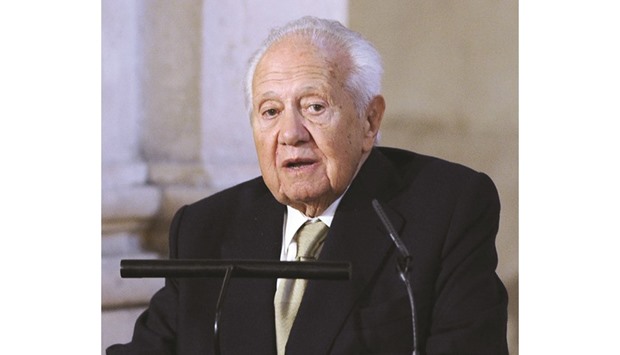Portugal’s former president Mario Soares, widely seen as the father of the country’s modern-day democracy, died yesterday aged 92 in Lisbon, a fortnight after being admitted to hospital.
The founder of Portugal’s Socialist party, Soares spent decades in politics, serving as the country’s president from 1986 to 1996.
He also served as foreign minister, prime minister and as a European lawmaker.
He was admitted to hospital on December 13, and although his condition initially showed signs of some improvement, he later fell into a deep coma from which he never recovered.
The hospital did not reveal the precise cause of Soares’s death, but relatives say he never fully overcame a spate of illness in 2013.
His health further deteriorated after his wife passed away in July 2015.
Born in Lisbon on December 7, 1924, Mario Alberto Nobre Lopes Soares was raised in a family opposed to the dictatorship of Antonio Oliveira Salazar.
His father Joao Soares, a defrocked priest, struggled against the regime for decades, suffering long periods of imprisonment and exile.
Reassuringly portly, Mario Soares was both a charmer and a humanist known for being spontaneous and warm.
A self-defined agnostic, Soares said he believed in “humanity and its improvement”, and described himself as being driven by “a great desire to live and by immense curiosity”.
“I am a poor man who has been fortunate to have taken stands and to have been right,” he told the i daily in February 2015, rejecting the idea he was an “immortal” figure.
Several politicians, including President Marcelo Rebelo de Sousa and Prime Minister Antonio Costa visited Soares in hospital in recent weeks.
“There are certain figures who have made their mark ... on our democracy. We don’t need to have the same political leanings to recognise what they have done for our democracy,” conservative leader Rebelo de Sousa said at the time.
Lisbon’s Socialist mayor Fernando Medina had also visited Soares’s bedside.
“My generation has always lived in freedom and we owe that, to a great extent, to Mario Soares,” Medina said.
While the former president retired from public life for several months after a crushing election defeat in 2006, he reappeared regularly in the media to comment on current affairs.
He emerged as a fierce critic of the steep spending cuts Portugal was forced to implement under a €78bn bailout deal reached in 2011 with the EU and International Monetary Fund (IMF) to avert bankruptcy.
Soares accused big European nations at the time of being guided by “savage capitalism”.
He made a final public appearance in July, when he attended a ceremony held in his honour by the ruling Socialist-led government.
Visibly frail, he did not make a speech.

This file picture taken on June 12, 2010 shows Soares delivering a speech during an event.
